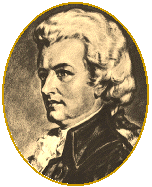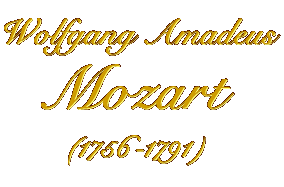

MIDI Files | Recommended Recoridngs | Books and Printed Music
Biography
(by Joe Meerdter)
Mozart's Childhood:
Joannes Chrysostomus Wolfgangus Theophilus Mozart was born in Salzburg, Bavaria (Austria) to Leopold and Anna Pertl in 1756. He was the second surviving child (out of seven). The other surviving child was Maria Anna, who was born in 1751. Mozart never preferred the name "Theophilus," which means, "love of God," instead he preferred the more common name "Gottlieb" and translated it to Amade or Amadeo.Wolfgang grew up to be "a boy wonder" and a prodigy child. At the age of three years old, Wolfy (nickname) had memorized several minuets for the clavichord. At the age of six, Mozart had already begun to compose music and was dubbed as a harpsichord virtuoso.
Little Wolfgang did not receive very much schooling as a youngster, but what he lacked in knowledge was certainly made up in a wealth of culture. Around this time of Wolfgang's life, his father took him to places like Italy, England, and Holland to showcase his talent. (It is a known fact that Mozart's sister had a talent that almost matched Wolfgang's, so she was included in these trips as well.) During their stay in these Papal cities, Leopold took Wolfy to symphonies and he especially took a liking to opera. Because of so much exposure to so many different cultures, Mozart learned 15 different languages. The little prodigy was also subjected to various tests to prove his talent to kings all over Europe. The people were amazed to see that Mozart could hear a melody only once, and be able to play it back in the verbatim on not only the keyboard, but the violin as well. The little Mozart also would be given a familiar piece to play with the cloth from the keyboard tied to his face so he couldn't see the keys. He could be able to play the pieces without flaw. Finally, they gave him writing tests to see his talent in composition. Mozart was a little over 10 years old at this time, because at an earlier age Leopold transcribed most of Wolfgang's music. However, they gave Mozart a melody in the treble clef, and he would be expected to write a basso continuo part. At this point, he was able to write these melodies without the use of an instrument to hear what he had written.
Mozart was eight years old when he wrote his first symphony, it is more likely than less that his father transcribed most of it for him. When he was 11 years old he wrote an oratorio, and he was 12 years old when he wrote his first opera. In 1764, Mozart's first published compositions were released. By the time Mozart was about 15 years old he was granted a seat in the court orchestra by the prince-archbishop of Salzburg who claimed not to like his music but was merely being kind to the boy because his father served for the court.
Mozart's Adult Life:
During most of Mozart's time for the courts, he wrote psalms, and gave keyboard and violin lessons. Mozart felt more like a servant than a source of talent. He had gained so much attention and recognition as a child that he grew to have an amazing ego, and he expected to be the biggest and best no matter where he went. In 1777, Mozart put out several requests to leave the court to perform in other cities. After many denials, the Archbishop finally gave in and released Mozart. In Mannheim (one of the locations in the tour) Mozart fell in love with two things: The clarinet, and soprano Aloysia Weber. After his return from his tour, Mozart's mother took sick and died. When Mozart wrote to his father telling him the news, Leopold advised him to stay in Salzburg. Mozart returned to Salzburg only to find that he had no money, and that he could not get a suitable job composing. So, he took a job as a court organist and began to become very depressed. On top of all of this, Aloysia married another man. Mozart stuck around for a couple more years composing and working off commissions until he felt that he had to request another release. The archbishop denied this request and it is said that Mozart was so vulgar during the interview that he was literally kicked out from his position. Mozart then moved to Vienna, the city where musicians played at every street corner.In Vienna, Mozart's career flourished (as compared to the Salzburg years). Mozart made a decent living as a composer and pianist. He also took an interest in Aloysia's sister, Constanze, and married her in 1782. They stayed at the Weber's apartment building. Mozart wrote a great deal of Operas in Vienna including: The Abduction from the Harem, The Marriage of Figaro (which stirred some controversy due to the French revolution), Cosi fan tutte, and wrote several symphonies and piano concertos which were primarily a way to get him to sell opera tickets. It was also in Vienna where Mozart met up with the well-known composer, Haydn, and they influenced each others work immensely. Haydn and Mozart would meet and give each other musical advice on their string quartets and symphonies they were working on at the time. Suggestions would take over conversation and a close relationship developed between the two.
Mozart's Last Year:
As we know from letters, Mozart had an extensive drinking problem. It was so bad that it put him deep into debt, so naturally he had to take more commissions to stay alive and support his family. In August of 1791 a mysterious man came to Mozart's door and requested a requiem mass (a mass honoring the deceased). Mozart was to tell no one about it and he would be paid well. We now know this man's name to be Count Franz Walsegg zu Stuppach. He enjoyed commissioning works from well-known composers and copying them in his hand to pass them off as being his own. This requiem was intended to be for the Count's recently deceased wife.It is a known fact that Mozart was a very superstitious person who was scared of the dark and of supernatural beings. Mozart had a very hard time writing this requiem mass because he thought that this mass would be honoring his own death. So, he procrastinated in getting started.
Throughout Mozart's life, he was diagnosed as having chronic rheumatic fever. He took several days off from concert and composing the requiem because he simply could not handle it. Nevertheless, after a couple days he resumed writing. Towards the end of November of 1791, Mozart was in real bad shape. He had another re-laps of the fever and became deathly ill. He discussed the requiem with his pupil Sussmayer, and told him what he wanted the finished product to sound like. Mozart was found one day lying unconscious on his study. He was awoken and put on his deathbed. He kept urging days before that he thought that he had been poisoned. Mozart died on December 5, 1791 he was 35 years old. It is stated that some of the last sounds that murmured from his breath, were the drum parts to the requiem. Mozart had a third class funeral and was buried in a mass grave. Weather records show that it was an unusually rainy day, as it was December.
Mozart's death remains a mystery, mainly because no autopsy was performed. His body swelled up after his death, which leaves many people to believe that he was poisoned. Some people say that Antonio Salieri poisoned Mozart, but this is completely myth and rumor. Antonio Salieri did confess on his deathbed to poisoning Mozart, but that proved to be far fetched because they didn't know each other that well in the first place, and there was no motive except for the fact that he believed Mozart was after his job as Court Composer. The most common answer to his death lies in the mercury the doctor prescribed for him to break his fever, and he was a heavy drinker; therefore, his kidneys and liver failed.
As for the Requiem, it was completed by Sussmayer, and Mozart's wife & Sussmayer sold it to the Count. The Count recopied the entire score in his own handwriting and gave it to a violinist named Benaro so he could copy the individual parts down. Mozart completed about 80% of the Requiem itself including the basso continuo parts, drafts for SATB and strings.
Mozart was definitely one of the most influential composers of the 18th century; his work influenced the great Beethoven, and other giants from the crossover between the Classical period and the Romantic period. His music provided such sweet, and memorable melodies such as "Eine Kleine Nachtmusik" and powerful driving rage as presented in the "Dies Irae" from his requiem mass. His form was also perfect. Wolfgang Mozart perfected the Classical Symphony that would set the standards of composers to come.
-J. Meerdter
